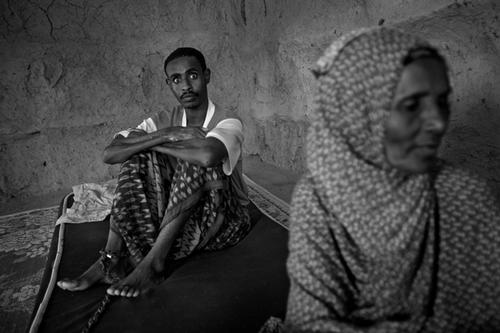Siyad Abdi Ar was 16 when he was abused by gunmen in Somalia. Eight years later, the mental scars have still not healed. Since arriving at Kenya’s Dadaab refugee camp in 2010, his mother has kept him chained to a bed by his ankle, anxious that he will wander off and do himself harm.
Many of the refugees arriving at Dadaab are traumatised by their experiences in Somalia, where violence and drought led to them fleeing their homes. Since 2009, MSF has provided healthcare in Dadaab’s Dagahaley camp, where services on offer include much-needed mental healthcare and counselling. In Kenya, as in other countries where MSF works, psychologists now form an integral part of the medical organisation’s teams.
“In Dadaab, and Africa in general, psychological distress is often not expressed in the same way as in richer countries,” says psychiatrist Pablo Melgar Gomez, who worked in Dadaab from 2009 to 2010 and is now working with Palestinian refugees in Lebanon. “People often complain of physical pains. During the consultation, we try to make them understand that these pains are related to their emotional state."
A couple of consultations are often enough to help people find a way of coping with their psychological distress. But people with more serious mental health conditions – including schizophrenia and bipolar disorder – may not get the treatment they need.
“While I was in Dadaab, I saw dozens of people with mental health problems who’d been chained up or shut away by their families, who were at a complete loss as to how to handle them,” says Gomez. “If we hadn’t intervened, they would be completely without hope of receiving psychiatric care and would still be chained up today.”
Some 450 million people worldwide suffer from mental disorders, according to the World Health Organization (WHO), while an enormous gap exists between those who need mental healthcare and those who receive it.
During wars or following natural disasters, the proportion of people suffering depression or anxiety – a normal reaction to abnormal events – often doubles or triples. In extreme situations, the whole population experiences increased anxiety or sadness. Most people get through it alone or with the help of friends and family. But for others, psychological or psychiatric care are necessary.
In crisis situations, MSF psychologists deal with the most urgent needs first. After the Haiti earthquake in January 2010, MSF staff offered emergency consultations to help patients overcome their immediate trauma, while providing treatment to people suffering from severe mental disorders.
Psychological distress can be hard to identify when it manifests itself as physical pain, and one of the tasks of MSF psychologists is to train other medical staff to spot those patients. Typically they are people who complain of unspecific pains or who come back several times without getting a proper diagnosis – one reason why it is so important to integrate the management of mental healthcare into other medical activities.
Beyond refugee camps, natural disasters and war zones, MSF psychologists provide counselling to people in a wide range of situations, including victims of sexual violence in the Democratic Republic of the Congo (DRC) and Guatemala.
“Psychological assistance can help HIV/AIDS or TB patients follow their treatment better,” says Gomez, “while in a nutrition centre, a mother won’t be able to look after her child properly and ensure it puts on weight if she is suffering from depression.”
In 2011, in the countries where MSF works, our teams of psychologists carried out almost 17,000 individual mental health consultations and 19,200 group counselling sessions.



